Flare-On4 解题复现
01
是一个 html 页面, 用开发者工具看看,发现是简单的 js 加密。
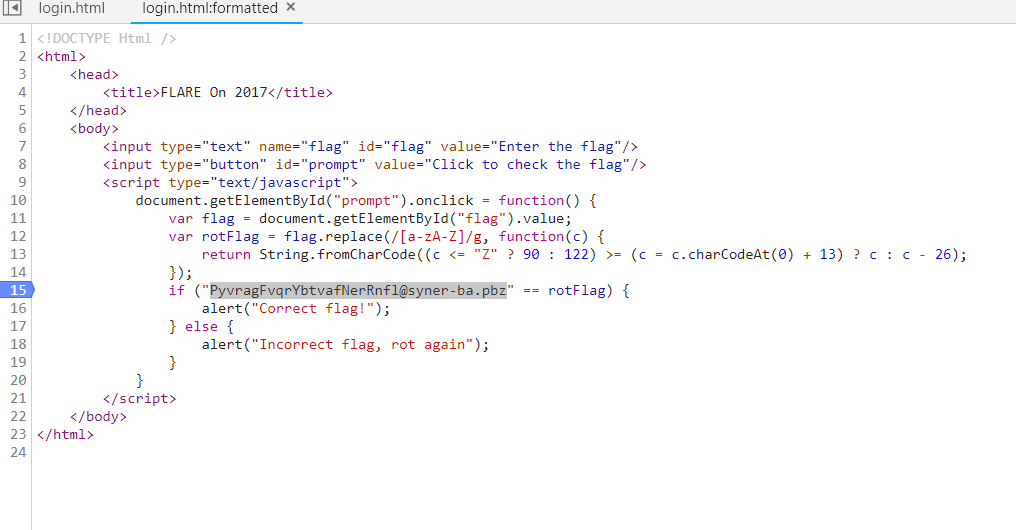
猜测加密算法可逆,试着用 PyvragFvqrYbtvafNerRnfl@syner-ba.pbz 作为输入,然后调试 ,得到 flag 为 ClientSideLoginsAreEasy@flare-on.com
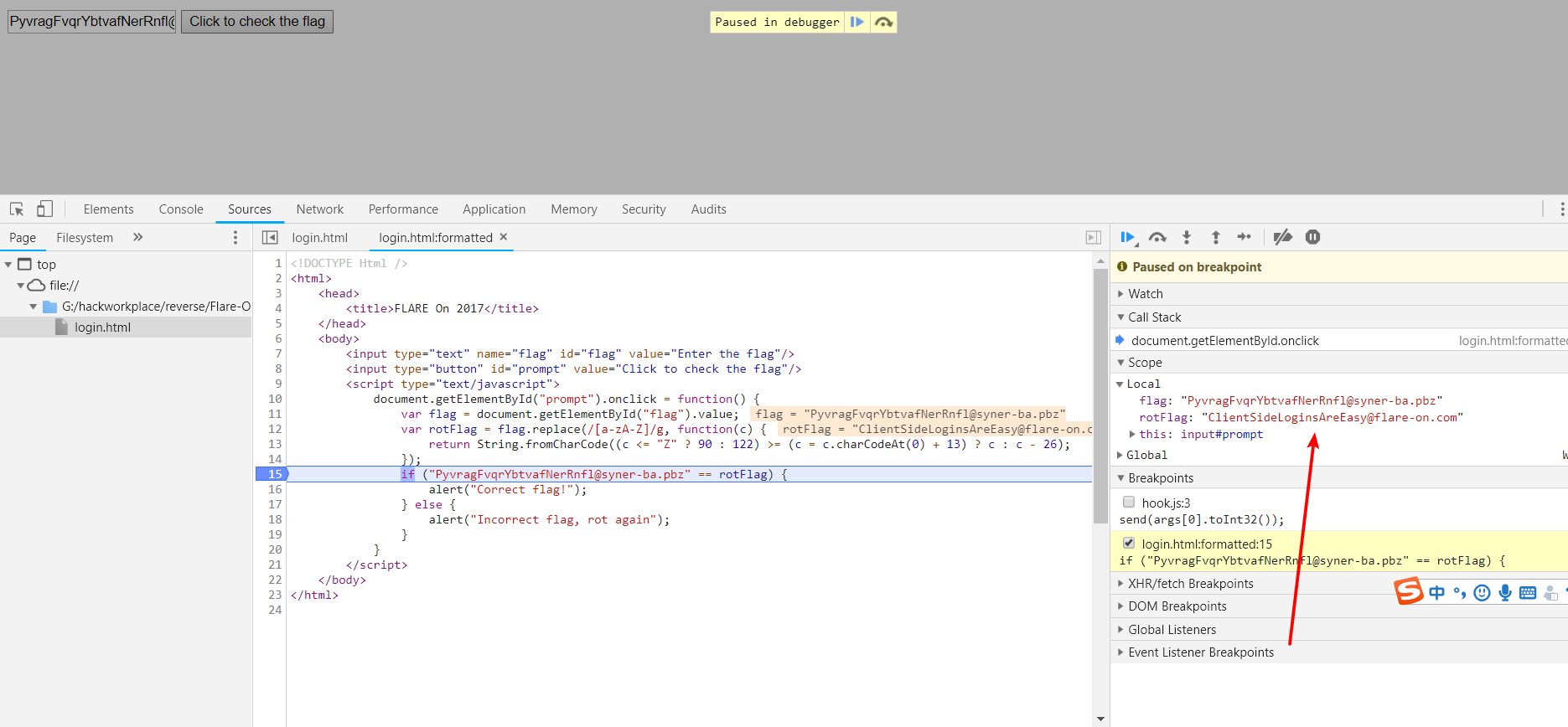
02
程序逻辑如下
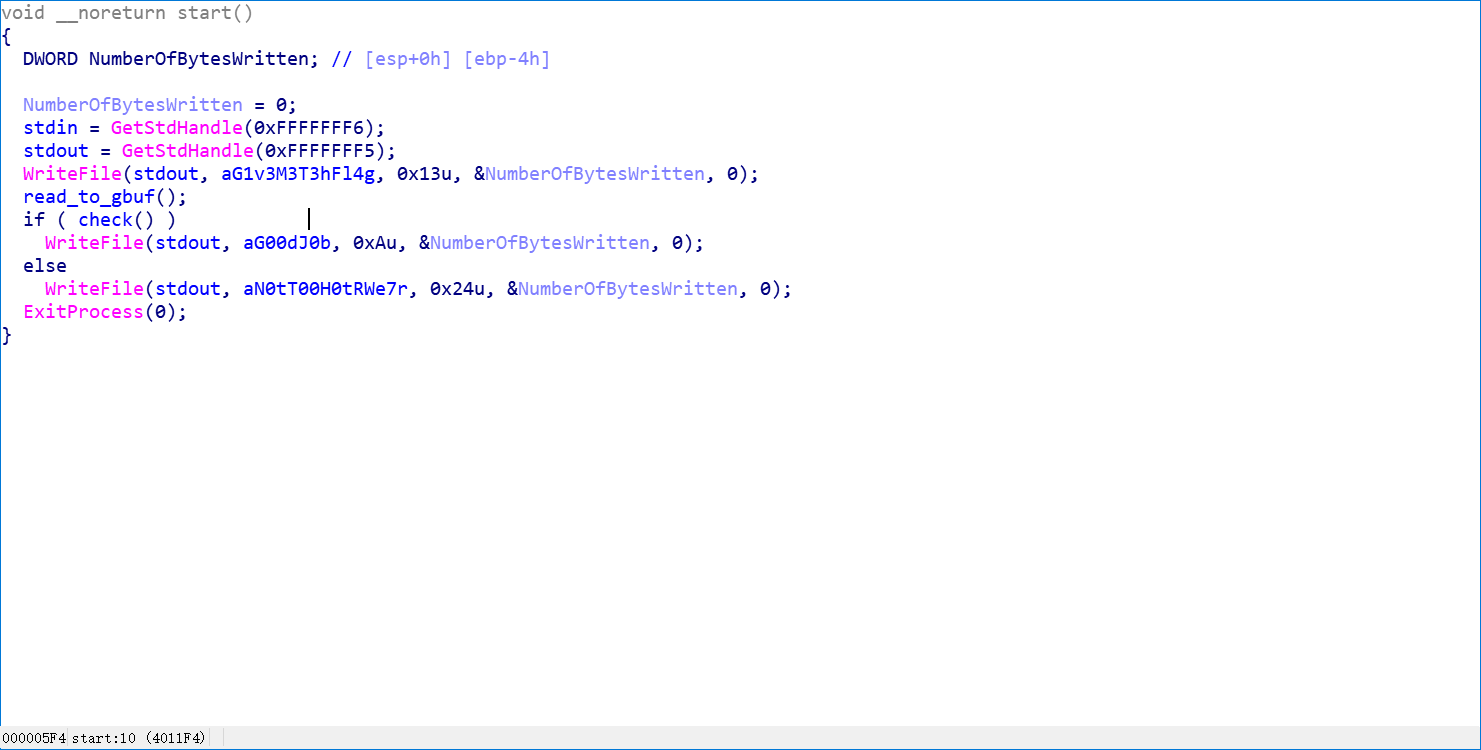
首先 获取输入, 然后 调用 check 进行判断, 下面分析 check 函数
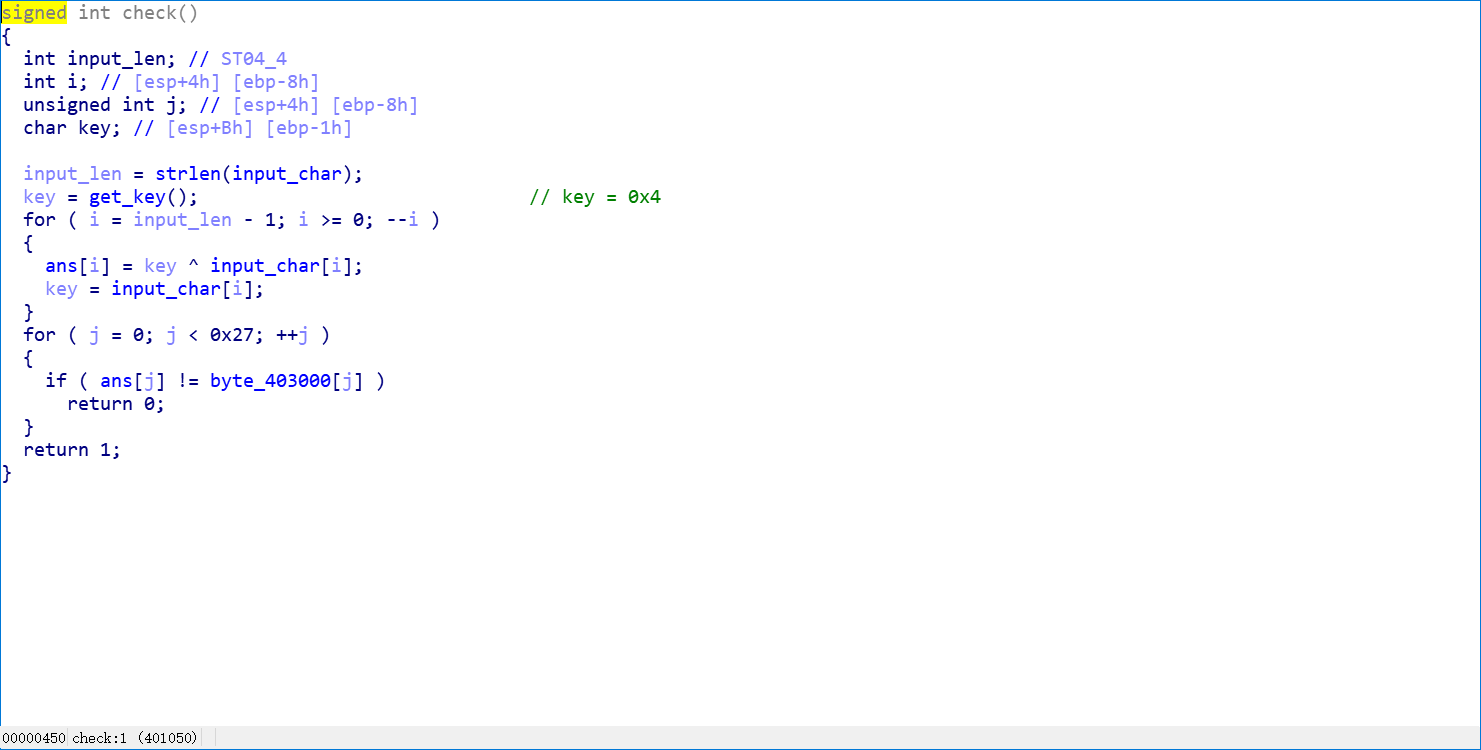
通过异或操作加密我们的输入, 首先获取一个固定的初始 key , 后面每一步 key 从输入中取,获取到密文后就和 程序中已有的密文做对比。
那么 flag 应该就是程序里面那段密文解密后的字符串, 对加密算法求反,写出解密的 idapython 脚本
import idc
encoded_data = get_bytes(0x403000, 0x27)
key = 0x4
flag = ""
i = 0x26
while i >= 0:
key = ord(encoded_data[i])^key
flag = chr(key) + flag
i = i - 1
print flag
由于 key 是输入中来的,所以这里的 key 应该是解密后的数据。得出 flag 为
R_y0u_H0t_3n0ugH_t0_1gn1t3@flare-on.com
03
分析
程序首先监听 2222 端口,然后接收 4 个字节
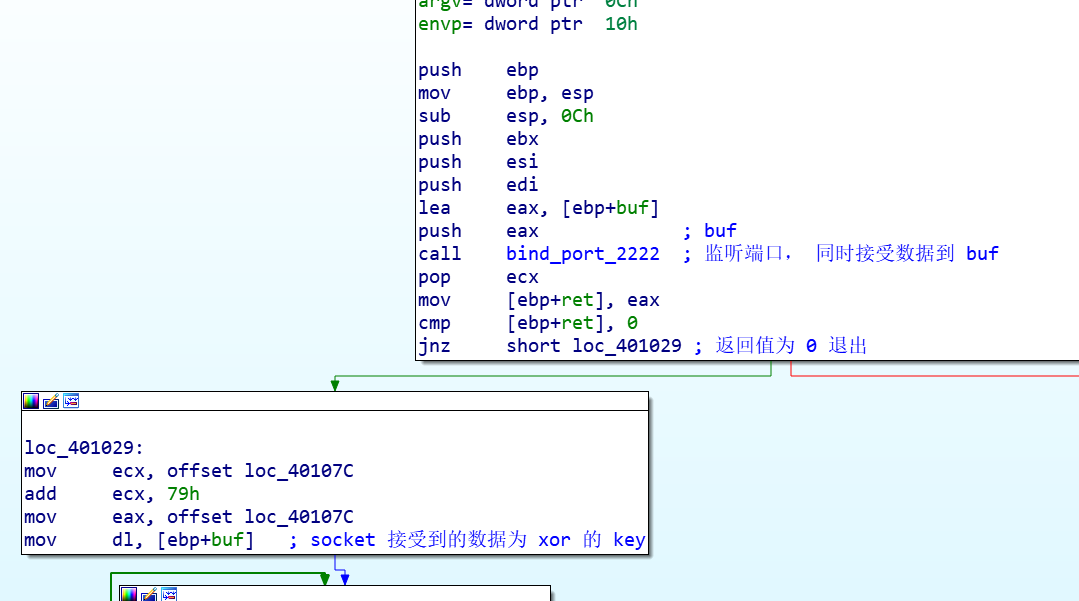
然后用刚接收的 4 个字节的其中一个字节作为 key , 对 0x40107C 开始的 0x79 字节的代码进行解密,然后校验解密后的数据,校验成功继续执行,如果不成功则退出。
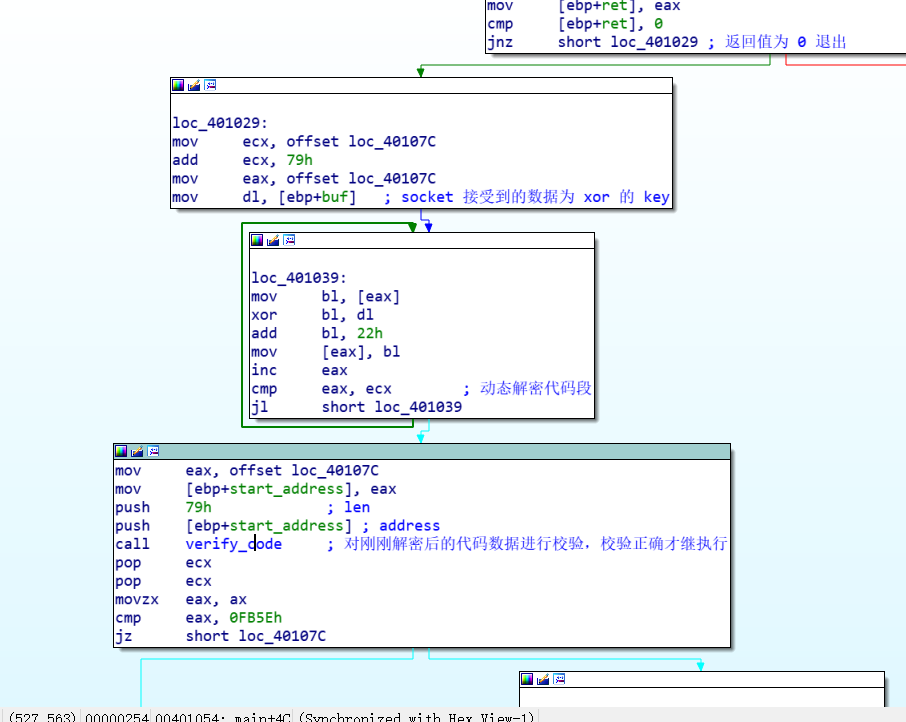
所以想要继续分析,首先得解出解密代码的 key , key 的大小为 1 个字节,255 中可能。爆破之即可。
解密
借助 unicorn
把解密逻辑用 python 实现, 然后把 校验解密结果的代码用 unicorn 模拟运行,然后整合一下爆破出正确的解密 key
import binascii
import struct
from unicorn import *
from unicorn.x86_const import *
def list_to_str(arr):
res = ""
for i in arr:
res += chr(i)
return res
verify_code = list_to_str([
0x55, 0x8B, 0xEC, 0x51, 0x8B, 0x55, 0x0C, 0xB9, 0xFF, 0x00, 0x00, 0x00, 0x89, 0x4D, 0xFC, 0x85,
0xD2, 0x74, 0x51, 0x53, 0x8B, 0x5D, 0x08, 0x56, 0x57, 0x6A, 0x14, 0x58, 0x66, 0x8B, 0x7D, 0xFC,
0x3B, 0xD0, 0x8B, 0xF2, 0x0F, 0x47, 0xF0, 0x2B, 0xD6, 0x0F, 0xB6, 0x03, 0x66, 0x03, 0xF8, 0x66,
0x89, 0x7D, 0xFC, 0x03, 0x4D, 0xFC, 0x43, 0x83, 0xEE, 0x01, 0x75, 0xED, 0x0F, 0xB6, 0x45, 0xFC,
0x66, 0xC1, 0xEF, 0x08, 0x66, 0x03, 0xC7, 0x0F, 0xB7, 0xC0, 0x89, 0x45, 0xFC, 0x0F, 0xB6, 0xC1,
0x66, 0xC1, 0xE9, 0x08, 0x66, 0x03, 0xC1, 0x0F, 0xB7, 0xC8, 0x6A, 0x14, 0x58, 0x85, 0xD2, 0x75,
0xBB, 0x5F, 0x5E, 0x5B, 0x0F, 0xB6, 0x55, 0xFC, 0x8B, 0xC1, 0xC1, 0xE1, 0x08, 0x25, 0x00, 0xFF,
0x00, 0x00, 0x03, 0xC1, 0x66, 0x8B, 0x4D, 0xFC, 0x66, 0xC1, 0xE9, 0x08, 0x66, 0x03, 0xD1, 0x66,
0x0B, 0xC2, 0x8B, 0xE5, 0x5D
])
encoded_code = list_to_str(
[0x33, 0xE1, 0xC4, 0x99, 0x11, 0x06, 0x81, 0x16, 0xF0, 0x32, 0x9F, 0xC4, 0x91, 0x17, 0x06, 0x81,
0x14, 0xF0, 0x06, 0x81, 0x15, 0xF1, 0xC4, 0x91, 0x1A, 0x06, 0x81, 0x1B, 0xE2, 0x06, 0x81, 0x18,
0xF2, 0x06, 0x81, 0x19, 0xF1, 0x06, 0x81, 0x1E, 0xF0, 0xC4, 0x99, 0x1F, 0xC4, 0x91, 0x1C, 0x06,
0x81, 0x1D, 0xE6, 0x06, 0x81, 0x62, 0xEF, 0x06, 0x81, 0x63, 0xF2, 0x06, 0x81, 0x60, 0xE3, 0xC4,
0x99, 0x61, 0x06, 0x81, 0x66, 0xBC, 0x06, 0x81, 0x67, 0xE6, 0x06, 0x81, 0x64, 0xE8, 0x06, 0x81,
0x65, 0x9D, 0x06, 0x81, 0x6A, 0xF2, 0xC4, 0x99, 0x6B, 0x06, 0x81, 0x68, 0xA9, 0x06, 0x81, 0x69,
0xEF, 0x06, 0x81, 0x6E, 0xEE, 0x06, 0x81, 0x6F, 0xAE, 0x06, 0x81, 0x6C, 0xE3, 0x06, 0x81, 0x6D,
0xEF, 0x06, 0x81, 0x72, 0xE9, 0x06, 0x81, 0x73, 0x7C])
def decode_bytes(i):
decoded_bytes = ""
for byte in encoded_code:
decoded_bytes += chr(((ord(byte) ^ i) + 0x22) & 0xFF)
return decoded_bytes
def emulate_checksum(decoded_bytes):
# establish memory addresses for checksum code, stack, and decoded bytes
address = 0
stack_addr = 0x10000
dec_bytes_addr = 0x20000
# write checksum code and decoded bytes into memory
mu = Uc(UC_ARCH_X86, UC_MODE_32)
mu.mem_map(address, 2 * 1024 * 1024)
mu.mem_write(address, verify_code)
mu.mem_write(dec_bytes_addr, decoded_bytes)
# place the address of decoded bytes and size on the stack
mu.reg_write(UC_X86_REG_ESP, stack_addr)
mu.mem_write(stack_addr + 4, struct.pack('<I', dec_bytes_addr)) # arg1 , address
mu.mem_write(stack_addr + 8, struct.pack('<I', 0x79)) # arg2 , len
# emulate and read result in AX
mu.emu_start(address, address + len(verify_code))
checksum = mu.reg_read(UC_X86_REG_AX)
return checksum
for i in range(256):
checksum = emulate_checksum(decode_bytes(i))
if checksum & 0xffff == 0xFB5E:
print(hex(i))
break`
其中 verify_code 不需要 ret 指令,因为我们只需要函数的返回值。
最后得到的 key 为 0xa2, 然后在调试的时候,设置正常的 key,解密代码后发现是一段复制语句,调试 得到 flag`
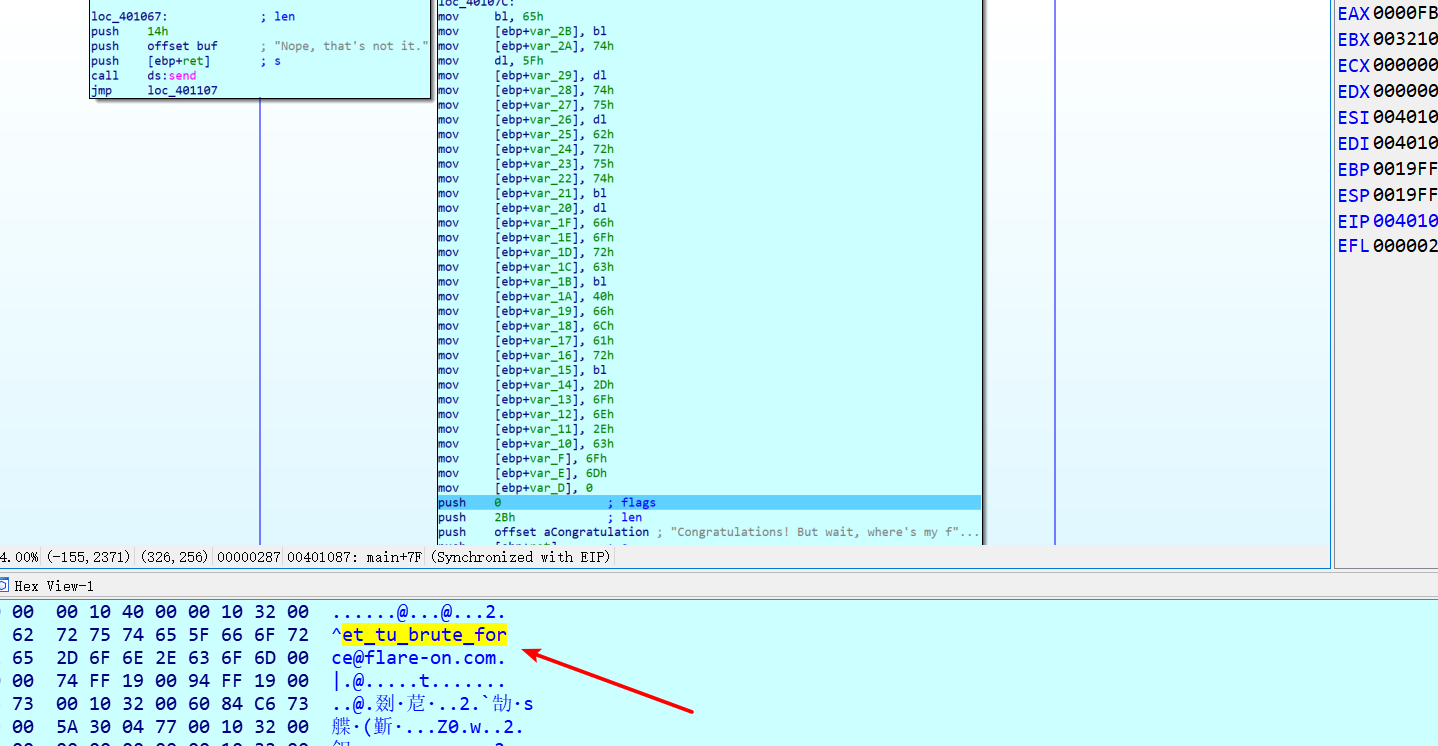
flag
et_tu_brute_force@flare-on.com
借助 frida
# -*- coding:utf-8 -*-
from __future__ import print_function
import frida
from time import sleep
retval = 0
is_ret = 0
def list_to_str(arr):
res = ""
for i in arr:
res += chr(i)
return res
def str_to_list(string):
res = []
for i in string:
res.append(ord(i))
return res
encoded_code_array = [0x33, 0xE1, 0xC4, 0x99, 0x11, 0x06, 0x81, 0x16, 0xF0, 0x32, 0x9F, 0xC4, 0x91, 0x17, 0x06, 0x81,
0x14, 0xF0, 0x06, 0x81, 0x15, 0xF1, 0xC4, 0x91, 0x1A, 0x06, 0x81, 0x1B, 0xE2, 0x06, 0x81, 0x18,
0xF2, 0x06, 0x81, 0x19, 0xF1, 0x06, 0x81, 0x1E, 0xF0, 0xC4, 0x99, 0x1F, 0xC4, 0x91, 0x1C, 0x06,
0x81, 0x1D, 0xE6, 0x06, 0x81, 0x62, 0xEF, 0x06, 0x81, 0x63, 0xF2, 0x06, 0x81, 0x60, 0xE3, 0xC4,
0x99, 0x61, 0x06, 0x81, 0x66, 0xBC, 0x06, 0x81, 0x67, 0xE6, 0x06, 0x81, 0x64, 0xE8, 0x06, 0x81,
0x65, 0x9D, 0x06, 0x81, 0x6A, 0xF2, 0xC4, 0x99, 0x6B, 0x06, 0x81, 0x68, 0xA9, 0x06, 0x81, 0x69,
0xEF, 0x06, 0x81, 0x6E, 0xEE, 0x06, 0x81, 0x6F, 0xAE, 0x06, 0x81, 0x6C, 0xE3, 0x06, 0x81, 0x6D,
0xEF, 0x06, 0x81, 0x72, 0xE9, 0x06, 0x81, 0x73, 0x7C]
encoded_code = list_to_str(encoded_code_array)
def on_message(message, data):
global retval,is_ret
retval = message['payload']
is_ret = 1
def decode_bytes(i):
decoded_bytes = ""
for byte in encoded_code:
decoded_bytes += chr(((ord(byte) ^ i) + 0x22) & 0xFF)
return decoded_bytes
def main():
global retval, is_ret
session = frida.attach("greek_to_me.exe")
for i in range(256):
script = session.create_script("""
var verify_code = ptr('0x4011E6');
var f = new NativeFunction(verify_code, 'int', ['pointer', 'int']);
var save_address = ptr('0x40107C');
Memory.writeByteArray(save_address, {})
send(f(save_address, 121));
""".format(str_to_list(decode_bytes(i))))
script.on('message', on_message)
script.load()
while is_ret != 1: # 等待远程函数执行完
sleep(0.2)
is_ret = 0
if retval & 0xffff == 0xFB5E:
print(hex(i))
break
session.detach()
if __name__ == '__main__':
main()
每次解密code后,直接用 frida 调用进程里面的校验函数,通过这样可以爆破出 key
最后附一个导出光标所在函数的二进制代码的 idapython 脚本
import idaapi
def list_to_str(arr):
res = ""
for i in arr:
res += chr(i)
return res
def str_to_list(string):
res = []
for i in string:
res.append(ord(i))
return res
compiled_functions = {}
def ida_run_python_function(func_name):
if func_name not in compiled_functions:
ida_func_name = "py_%s" % func_name
idaapi.CompileLine('static %s() { RunPythonStatement("%s()"); }'
% (ida_func_name, func_name))
compiled_functions[func_name] = ida_func_name
return ida_func_name
def GetFunctionCode():
func_start = get_func_attr(here(), FUNCATTR_START)
func_end = get_func_attr(here(), FUNCATTR_END)
func_name = GetFunctionName(func_start)
data = get_bytes(func_start, func_end - func_start)
with open(func_name, "wb") as fp:
fp.write(data)
with open(func_name + ".list", "w") as fp:
fp.write(str(str_to_list(data)))
Message("Write code of %s done!!!\n" %(func_name))
AddHotkey("Ctrl+Shift+A", ida_run_python_function("GetFunctionCode"));
参考



